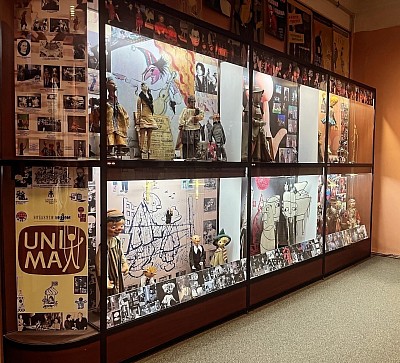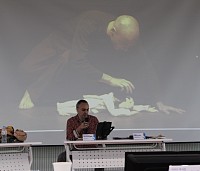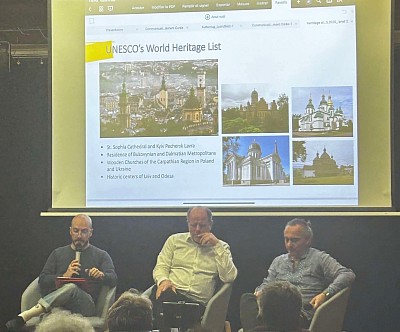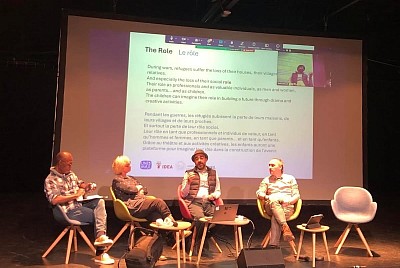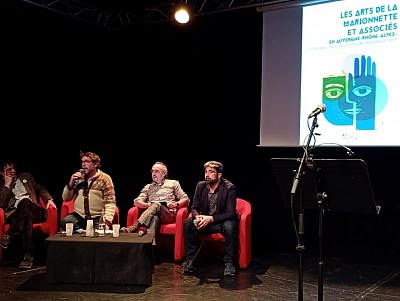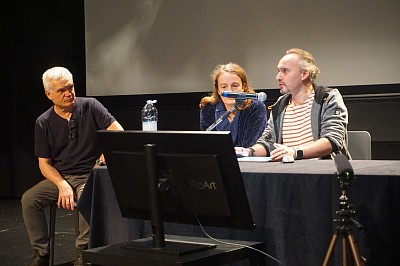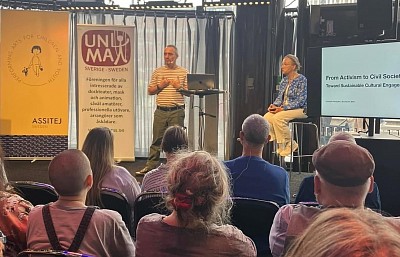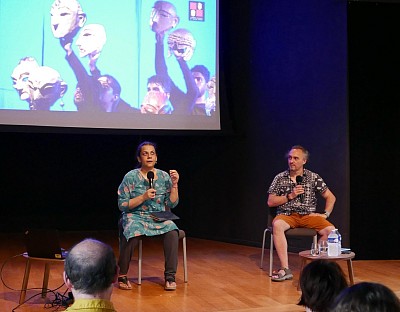Interventions, reflections and puppets in action!
February 17, 2026
During a speech at UNESCO, I spoke on behalf of UNIMA - the International Puppetry Union - to raise awareness about the situation of artists and cultural actors working in contexts of war and crisis.
Bombed Heritage: Kharkiv Puppet Theatre Faces War
October 12, 3 p.m., Gadagne Museums
With Oxana Dmitriéva, director of the Kharkiv Puppet Theatre
Moderation: Clément Peretjatko
Since the start of the war in Ukraine, the Kharkiv Puppet Theatre, one of the most emblematic in the country, has faced a constant threat: bombings that endanger its artists and its precious collections, including historical pieces linked to Vertep, a popular tradition of Ukrainian puppet theatre.
This discussion aims to revisit the unique place of this theatre in the Ukrainian cultural landscape and the efforts made to preserve its works, its repertoire and its role of transmission, despite the dramatic context.
Oxana Dmitriéva, director of the theatre and a major figure in puppet theatre in Ukraine, will testify to the resilience of her team and its commitment to safeguarding this threatened heritage.
As part of the Sens Interdit festival, in partnership with the Théâtre Le Ciel, the Lyon-Ukraine association and the La Rose des Vents company.
Echoing the show Giraffe Mons, from the Kahrkiv Puppet Theatre, programmed from October 16 to 18 at the Ciel theatre , as part of the Sens interdits festival .
At the crossroads of tradition, imagination and contemporary creation
July 13, 2025, Anubhav #10, India
In this video, recorded at the invitation of the UNIMA Puppeteers Trust - India, I retrace the broad outlines of my artistic journey. A journey of more than twenty years, marked by space and time, which has deeply nourished my pedagogy. I talk about the place of writing in my work, the fundamental role of the hand, sculpture as an exercise in attention, the imagination as a way of looking at the world, and the puppet as a space for projection rather than explanation.
I also discuss my way of teaching: not transmitting ready-made answers, but offering fragments, tensions, invitations to search. For me, the puppet does not illustrate—it questions, it breathes, it opens.
This video is in preparation for the masterclasses I will be giving in September 2025 in India.
⬇️⬇️⬇️ watch in English
Challenging Boundaries: Contemporary Puppetry and Cultural Heritage
May 23, 2025, Chuncheon Symposium
At the Chuncheon International Symposium, I presented a career spanning more than twenty years in puppet theatre, marked by the exploration of traditional forms, contemporary writing and an artistic commitment to fragile contexts, often marked by war, exile or reconstruction.
Trained at ESNAM, I develop a theatre of tension, where the sacred and the profane, memory and fiction, the craft of gesture and the political scope of speech intersect. This work, carried out in more than twenty countries, has allowed me to observe the singular power of puppetry: an art capable of crossing linguistic, cultural and temporal borders, and of giving form to what cannot be said otherwise.
My intervention was structured around five axes: the reactivation of traditional forms; the shifting of boundaries between text and matter, notably through Ivšić and Miró; the creation of sensitive narratives in conflict zones; the example of Maidan Inferno , where the Ukrainian Vertep becomes a theater of insurrection; and finally, the puppet as a critical tool in the Balkans, between popular satire and political poetry.
I advocate for a puppet without borders, both rooted in heritage and focused on contemporary issues. A puppet that questions, that doubts, that opens breaches—aesthetic, sensitive, collective. A fragile and resilient art, which does not claim to say everything, but invites us to listen differently.
Between memories and futures: living heritage and European stories
May 6, 2025, Jean Moulin University Lyon 3
As part of the Lyon Metropolis' Europe Month , I had the pleasure of inviting Ihor Poshyvailo, director of the National Museum and Memorial of Maidan in Kyiv , to speak at this round table that I co-organized and co-hosted on behalf of Lyon-Ukraine with KoToPo.
In his live broadcast from Kyiv, Ihor Poshyvailo shared a lucid and poignant analysis of the systematic destruction of Ukrainian cultural heritage since the Russian invasion: more than 1,400 heritage sites destroyed or damaged, museums, libraries and places of memory targeted, cultural professionals forced into exile.
But his testimony above all highlighted the decisive role of civil society in defending heritage in times of war. Thanks to the HERI (Heritage Emergency Rescue Initiative) and ACURE initiatives, Ihor and his partners were able to mobilize independent networks, experts, and volunteers, and create a structured response: documentation, evacuation, protection, training, and advocacy. This citizen mobilization, supported by international partnerships, has become a model for action in the face of violence.
Alongside him, two other speakers spoke about artistic and societal commitments that are part of European memory:
– Alice Hénaff, director of Plattform , presented a trinational project of choreographic and luminous creation around the memory of resistance in three European cities (Lyon, Chemnitz, Timișoara);
– Oliver Spatz, founder of Kulturzug , told the story of a cultural train line between Berlin and Wrocław that became a space for dialogue between peoples united by a complex history.
Moderation was provided by Betty Ruby ( KoToPo ) and myself, with interpretation by Enrico Lecca (Université Lyon 3).
This evening demonstrated how living heritage—as stories, places, gestures, and forms of resistance—forms an essential framework in the reconstruction of a common European imagination. And how its defense cannot rely solely on institutions, but rather on the commitment of civil societies, where crises are most directly experienced.
Puppetry in Art Education
March 26, 2025, ASSITEJ Congress, Marseille
As part of the international gathering Bright Generations – Générations Lumineuses, held in Marseille, I co-organized with Cariad Astle, Vice-President of UNIMA, a collective reflection session between ASSITEJ, UNIMA and IDEA. This meeting was held at the Friche la Belle de Mai and brought together artists, educators and cultural leaders to discuss the place of puppetry in contexts of war, displacement and reconstruction.
In my talk, I offered an answer to the question: “ In what ways can puppetry be a voice for luminous, decolonized, and unlearning-based futures? ”
There I shared a series of stories and experiences from Ukraine, Kosovo and several African countries, about how puppetry can become a tool for emancipation and reparation, particularly for young audiences affected by violence and disruption.
I have discussed the power of puppetry to embody invisible narratives, to bring to light forgotten or marginalized forms of knowledge, and to create spaces for unlearning—that is, for challenging dominant norms. Accessible, mobile, and profoundly hybrid, puppetry thus becomes an art of resistance: it allows us to reactivate popular memories, to transform silences into words, traumas into creative gestures.
Through this speech, I wanted to defend puppetry not only as an artistic practice, but as a political and poetic stance, capable of opening up luminous futures, based on circulation, listening and sharing.
The role of UNIMA in structuring the French cultural landscape
March 18, 2025, Bourg-En-Bresse Theater
During a regional meeting in Auvergne-Rhône-Alpes dedicated to the presentation of a study by the Ministry of Culture on the puppetry arts sector in the region, I was invited to present, through concrete examples, the role of UNIMA (International Union of Puppetry) in the structuring and development of the discipline, both in France and internationally. Founded in 1929 and an official partner of UNESCO, UNIMA is now present in more than 80 countries, THEMAA is the French national center.
International visibility and cultural advocacy
UNIMA plays an active role in major global cultural policy projects, particularly through its partnership with UNESCO. I mentioned our organization's involvement in the preparations for Mondiacult 2025, where discussions will focus on integrating culture as a full-fledged objective of the United Nations 2030 Agenda for Sustainable Development. UNIMA strongly advocates for the recognition of the role of artists in cultural policies, with particular emphasis on the situation of refugee artists.
Structuring in Auvergne-Rhône-Alpes and recognition of puppet aesthetics
In the regions, UNIMA acts as a facilitator of dialogue between artists, institutions and structures. I cited the emblematic case of the Ivorian company Ivoire Marionnette , recently in residence in Villeurbanne as a street art company, while it is considered throughout the African continent as a major puppet company. This difference in recognition questions the capacity of French institutional frameworks to integrate the diversity of puppetry traditions.
UNIMA also supports structuring international cooperation, such as the partnership between the Kharkiv Puppet Theatre (Ukraine) and the World Festival of Puppet Theatres in Charleville-Mézières , which I supported from its inception during World Puppet Day 2023. This support enabled the dissemination, outside the framework of UNIMA, of Ukrainian shows in the midst of war, which will be joined by regional partners such as the Scène nationale de Bourg-En-Bresse , the Théâtre Le Ciel and the Festival Sens Interdit in Lyon, with the support of ONDA.
International mobility and support for refugee artists
UNIMA also works to improve the circulation of artists and their works, in line with the 2005 UNESCO Convention on Cultural Diversity. Faced with visa refusals that hinder exchanges, we are working on concrete solutions, particularly with partner NGOs, such as Zone Franche ( artist visa committee ) in France or Artists at Risk in Finland. At the same time, we support refugee puppeteers, so that they maintain visibility and the right to participate within the UNIMA network.
A collective dynamic to support
This intervention was an opportunity to recall that artists and organizations are mobilized, but they need resources. To sustainably include puppetry in regional and international cultural policies, active support from institutions and funders is essential.
Beyond traditional accounting approaches - presentation in Italy of an observatory led by THEMAA
October 17, 2024, UNIMA Italy General Meeting, Genoa
The observatory led by THEMAA, " The Production of Puppet Shows ," analyzes the economic and artistic processes of puppet companies in France by focusing on invisible resources. It reveals that the majority of puppet companies rely on unaccounted contributions, such as unpaid labor time (96% of shows) or material donations (83% of shows), to compensate for the lack of public funding. Puppetry creation requires specific technical skills, particularly those related to puppet construction, a long development period, often two years, and constant adjustments between the construction workshop and the rehearsal space, which complicates its budgetary consideration. Most companies (60%) are not contracted, have annual budgets of less than €100,000, and frequently resort to self-production (40% of shows) and self-financing, representing on average 20% of the budget, and up to 24% for shows aimed at young audiences.
This fragile economic situation is forcing companies to innovate while facing significant insecurity. Most shows are unprofitable, with only 40% generating a margin, and an average selling price of €1,800, often insufficient to cover actual costs. Rural companies, in particular, have lower production budgets than those in urban areas. Despite these challenges, puppet companies manage to maintain their creativity thanks to internal solidarity and the intermittent performance system. The study thus highlights the importance of increased support for this underfunded discipline, in order to promote an art that mobilizes significant human and material resources that are often invisible in official accounts.
The observatory raises the question: how can puppet companies be financially supported so that they can preserve their creativity without relying on unpaid resources? This question arises in a context where the French government is implementing a drastic cost-cutting plan and intensifying the fight against illegal employment, without taking into account certain realities such as those of puppet companies. Indeed, faced with the constraints they face, insufficient funding pushes companies to compensate with unpaid labor and material donations, thus threatening their economic and artistic stability.
Presentation at the invitation of UNIMA Italy within the framework of the grouping of UNIMA Spain, Italy and France (THEMAA).
From Activism to Civil Society: Towards Sustainable Cultural Engagement
August 23, 2024, Kulturhuset Stadsteatern, Stockholm
The issue I wanted to address was the impact of the war in Ukraine on culture, and more specifically on puppetry, a major art form in Ukraine that I strive to promote. As a puppeteer of Ukrainian origin, I am deeply affected by the way this conflict threatens not only human lives, but also the country's cultural heritage. My involvement in civil society and my recent travels to Ukraine, through artistic and humanitarian initiatives, led me to reflect on how we, as artists, can continue to create, transmit our knowledge, and preserve our heritage in a context of mass destruction.
I also emphasized the importance of international solidarity, through networks like UNIMA, to support Ukrainian artists in the face of this war. My work with young artists, particularly during the bombings in Ukraine over the past two years, has shown me how vital it is to maintain a connection with the outside world, despite the bombings and instability. We must collectively reflect on the place of culture in a world where borders and social systems are profoundly different from one country to another, and where the liberalization of the European market poses new challenges for artists.
Finally, beyond the artistic aspect, it is a whole civil society without borders that I wish to see emerge, a network of support and solidarity capable of transcending conflicts and preserving the soul of a people through its culture.
This performance took place at Kulturhuset Stadsteatern as part of the international puppet festival POP UP PUPPETS, with the support of UNIMA and ASSITEJ Sweden.
Preserving Indian Cultural Traditions through Puppetry Arts
With Indian puppeteer Anurupa Roy
July 27, 2024, Gadagne Auditorium, Lyon
Within the Indian subcontinent lies a rich cultural heritage composed of a variety of traditional artistic expressions passed down from generation to generation, conveying the stories and customs that have shaped society for millennia. However, this precious heritage is today facing challenges that threaten its survival in an ever-changing world.
Puppeteer Anurupa Roy plays a vital role in preserving this link between past and present. Drawing on her experience and expertise, she will immerse us in the captivating history of puppetry in India, an art steeped in epics, local legends, and unique narrative nuances. These puppets were not just entertainment; they were keepers of a collective memory, narrators of everyday realities, and witnesses to social diversity.
This meeting is proposed by Clément Peretjatko in conjunction with the Gadagne Museum of Puppet Arts, as part of the DRAC Auvergne-Rhône-Alpes cultural summer.
